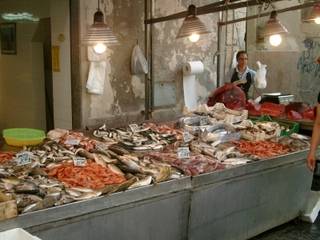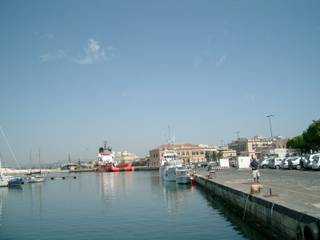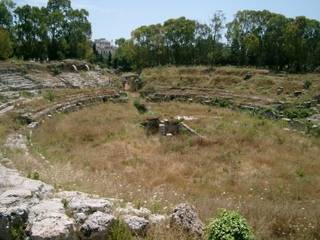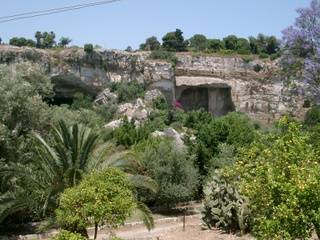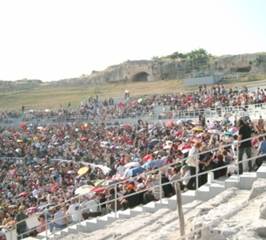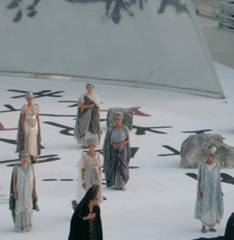Siracusa (Syracuse), Sicily (Medea - A Greek Tragedy)

|
Wednesday 10th June – Siracusa (Syracuse), Sicily (Medea - A Greek Tragedy) 37:03.596N 15:16.722E
Thankfully there was only a little impromptu swell overnight and we had a good night's sleep in a quiet anchorage. This morning we were up and out early, off to survey the street market in Ortiglia and buy provisions. We saw some great prawns and so decided on those for dinner, unfortunately for Richard the veg was also looking too good to be ignored.
On the way back we stopped to fill our jerry cans with water and then we brought our haul back to Pyxis to quickly stow before getting straight back into the dinghy to go off for some more sight-seeing, this time to the Neapolis-Parco Archeologico.
Just as we were ready to get into the dinghy, we saw Charlie and Anna arriving on Star Dance. They had just sailed overnight from Malta and have dropped their anchor just beyond us. We said 'hello' on our way past and let them get some sleep after their long journey.
The archaeological park was about a 30 minute walk away inland; by now it was late morning and very hot and we were definitely doing our 'Mad dogs and Englishmen' impression.
We first went to visit the 2nd century Anfiteatro Romano; it is fairly small, oval in shape and has not been marred by restoration work but left in its original state, complete with weeds – we liked it.
We then walked down the hill to visit the Teatro Greco and Orecchi di Dionigi, seeing the ruins of Ara di Ierone II on the way. At the entrance we needed tickets to go any further but were told they didn't sell the tickets there, as shown on our map, but right back at the large coach park.
On the way back we called into the Information Centre and I asked if they had any performances on at the moment in the Greek Theatre. They said they have a season of shows running and that they had a performance of 'Medea by Euripides' on tonight. In brief:
The Story of Medea by Euripides (484-406BC)
Medea has lived with Jason (as in the Argonauts) as man and wife and they have two children. In the past Medea has betrayed her father King Aaetes and was indirectly responsible for the death of King Pelias.
The story starts with King Creon telling Medea she must leave, with the children, so that Jason can marry Glauce, his daughter. She is not happy with this and confronts Jason, who also wants her to leave and blames her banishment on her own temper. She reminds him that as she is not Greek she will not be welcome elsewhere without a Greek mate and Jason offers to recommend her to the care of his many friends. In the end this is not necessary as, Aegeus, of Athens, arrives and says that Medea can stay with him.
With her future assured, she turns to other matters. Medea is a witch. Jason knows this, as does King Creon, but Medea seems appeased and so when she gives a robe and crown as a wedding gift to Glauce, she accepts. When Glauce puts on the robe, it burns her flesh and she dies; King Creon dies too as he tries to help his daughter.
However, Medea then murders her own two children. Her revenge comes as she witnesses Jason's horror as she flies off to Athens in the chariot of the sun god Helios, her ancestor.
From this description I thought that there would be enough action and drama for us to enjoy it despite not being understand the Italian dialogue (certainly a high body count) so we decided to combine our sight-seeing of the Greek Theatre with a performance of a classic Greek Tragedy – a first for us.
As an aside, the Tourist Information office is in the Chiesa di San Nicolo ai Cordari and below this is an ancient Roman piscina. This was used to store water so that they could flood the Roman amphitheatre to re-enact naval battles.
The ticket office for the theatrical performances was also at the coach park so we carried on there. At the coach park there were indeed signs saying that the ticket office was there but it still took an orienteering course to work out that if you wanted tickets you had to go past all the concession stalls to the stone building out in the field beyond; people kept queuing up at the ticket office for the theatre performances which was at the end of the concession stalls and having to be sent on.
Having got our tickets we returned to Pyxis mid afternoon, had an early prawn supper and went straight off again to the theatre for the evening performance.
We arrived at the theatre just after the doors opened at 5.45, as advised by the ticket office, although the show itself was not until 7.15. The theatre was already busy and people were already taking their seats as this performance was a 'sit anywhere you like' performance. We had been told this show would be quite popular as most of the other shows are much more expensive and you have to pay more depending where you sit. There were people of all ages in the audience.
We didn't mind where we would be sitting and went for a touristy wander around. The Greek Theatre is 5th century BC and has been entirely hewn out of solid rock, all white, facing down towards the bay. Much of the theatre has now been covered in wooden boarding as seating; however, some of the original stone was visible and available if you really did want a rough, hard seat. We elected for the wood ☺
Well, as we sat waiting for it to start, Richard, who's not so keen on this sort of thing, remarked that the tragedy was that we would has to sit through it all given where we were sat! Whilst I chided him, unfortunately, he was right. The story was told in a series of very impassioned monologues and arguments rather than as a drama per se – Glauce never even made an appearance, we just saw the cloak taken away and her death announced. The only way we knew the children had been killed was by a couple of screams off the side of the stage somewhere, just before the end.
The end was definitely the best part for a number of reasons: there was a spectacular departure by Medea as the actress was lifted up the back of the stage in the sun chariot to a very great height; we were all able to stand up as there had been no interval and our bottoms were numb; and the real sun was going down, giving a very beautiful light to complement the stage lighting.
In our defence, as I looked around during the performance, although probably the only non-Italians there, we certainly were not the only ones who didn't follow it all; some of the natives were getting restless and being told 'Shh' by the ushers towards the end.
It was certainly an experience though, and the performance by Medea was very dramatic. The cast took numerous 'curtain calls' at the end, although there was of course no curtain.
Afterwards, we walked back through town to the dinghy and, armed with a torch, made our way back across the anchorage in the dark to Pyxis.
Siracusa: Town and market
Siracusa: Anfiteatro Romano
Siracusa: Chiesa di San Nicolo ai Cordari and Roman Piscina beneath
Siracusa: Neapolis-Parco Archeologico
Siracusa: Teatro Greco
Siracusa: Parallel parking Sicilian style
© Pyxis 2009
|


